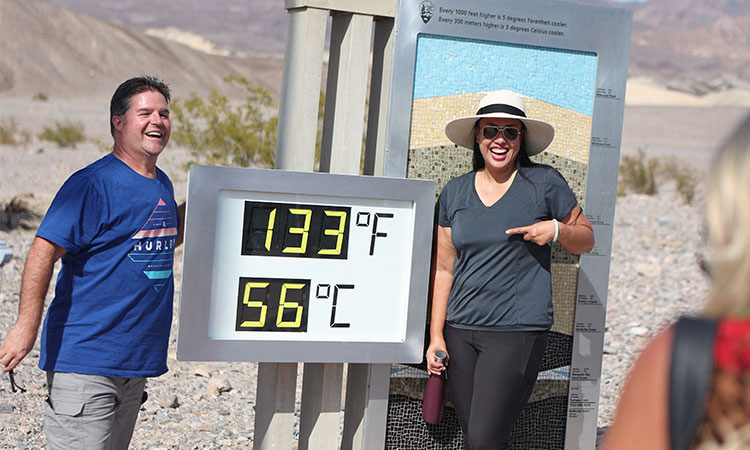Source: AFP
As heatwaves continue to grip various parts of the world, from Europe to the United States and Asia, experts are sounding the alarm about the increasing risks posed by these scorching temperatures. The relentless heat has led to health warnings, record-breaking highs, and severe impacts on both human populations and the environment.
In North America, a sweltering heatwave has settled over western and southern states, including Texas and California, while smoke from Canada's wildfires is engulfing the Midwest. More than 80 million people are under advisories, and even Death Valley, known for its extreme heat, recorded a near-record temperature of 52 degrees Celsius. Phoenix, Arizona, experienced an unprecedented 19 consecutive days with temperatures exceeding 43 degrees Celsius, leaving both residents and visitors trying to cope with the extreme conditions.
Over in Europe, the heatwave is hitting hard during the peak summer tourist season. The World Meteorological Organization (WMO) has expressed concerns about the potentially deadly impact of this heatwave, with an estimated 61,000 lives lost to heatwaves across the continent last year. Several regions, including Italy, northeastern Spain, Croatia, Serbia, and others, have issued red alerts as temperatures soar. Tourists in Rome have been seeking refuge in the city's fountains, and the health ministry has warned of red weather alerts in 20 major cities, with the number expected to rise.
The unyielding heat has sparked devastating wildfires in different parts of the world, from Greece to the Swiss Alps, causing widespread destruction. Japan has issued heatstroke alerts in many prefectures, with dozens already treated for heat-related illnesses. China's northwest experienced temperatures exceeding 52 degrees Celsius, exacerbating wildfires and wreaking havoc on ecosystems.
Scientists have long emphasized that climate change, driven by greenhouse gas emissions, is intensifying heatwaves, making them more frequent, severe, and lethal. Urgent action is required to curb emissions and prevent further climate-related catastrophes. Diplomatic efforts between the United States and China, being the leading greenhouse gas emitters, have added impetus to the global fight against climate change.
Authorities worldwide are urging people to take necessary precautions, such as staying hydrated, seeking shelter, and being vigilant about the risks posed by extreme heat. As we grapple with the harsh reality of these killer heatwaves and extreme weather events, the World Health Organization underscores the immediate need for regional and global action to tackle the climate crisis and safeguard humanity from this existential threat.
In conclusion, as our planet faces escalating heatwaves and extreme weather events, it is abundantly clear that decisive action is essential. We must come together as governments, communities, and individuals to combat climate change, reduce emissions, and protect human lives and the delicate balance of our environment. Only through collective efforts can we hope to mitigate the impact of these heatwaves and secure a sustainable future for generations to come.
Source: AP


